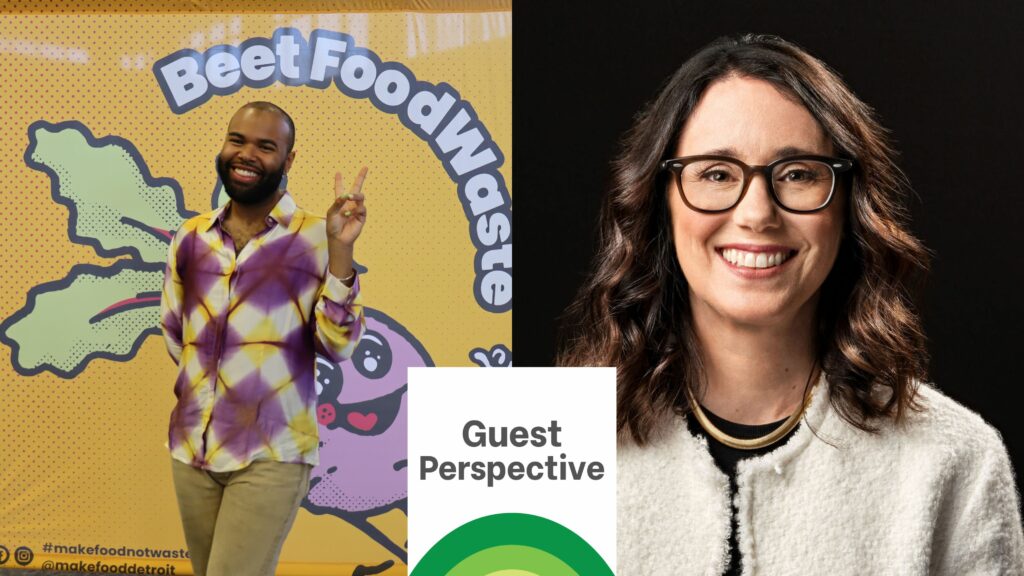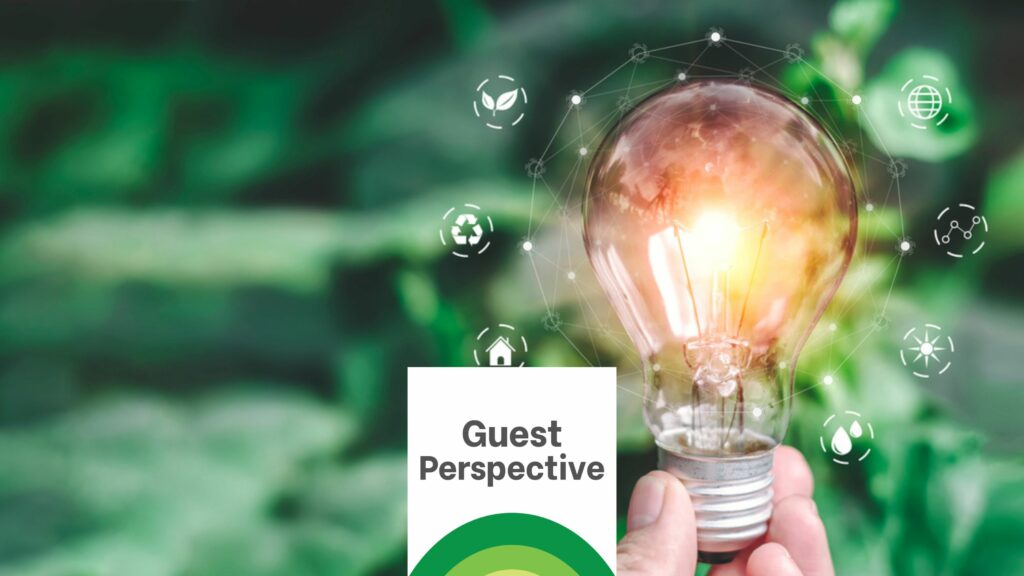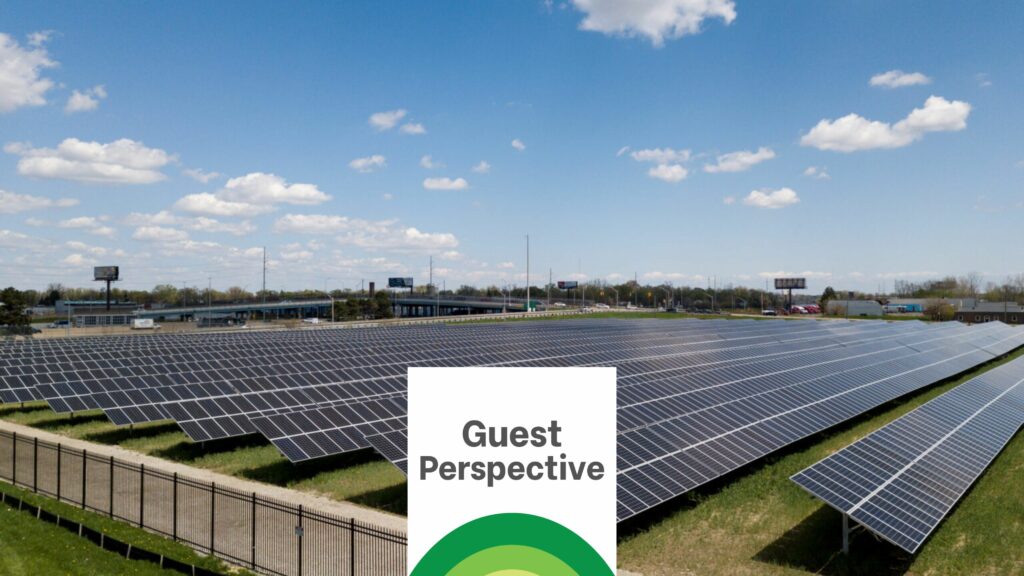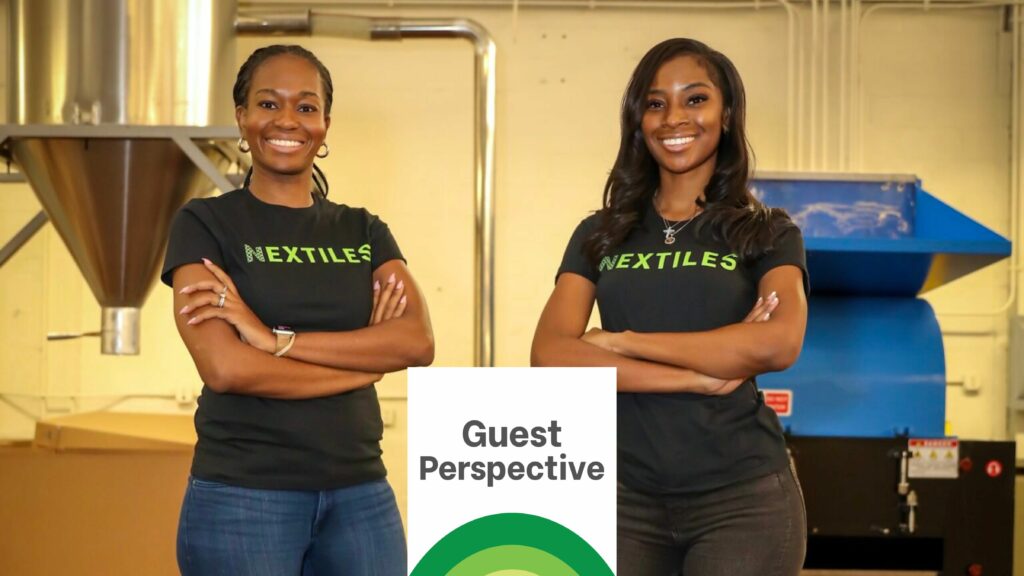Perspective on Eliminating Food Waste

DANIELLE TODD, IS THE EXECUTIVE DIRECTOR OF MAKE FOOD NOT WASTE Landfilled food is one of the primary sources of climate change due to two main reasons. First, food decomposing in landfills emits methane, a greenhouse gas 25 times more potent than carbon dioxide. Second, landfilled food represents a waste of land, water, and transportation resources that cannot be reclaimed. Given the substantial volume of food we send to landfills, methane emissions are skyrocketing and our resources are depleting at an alarming rate. Annually, Michiganders discard more than 2 billion pounds of food, resulting in approximately one-third of our landfills being composed of food waste. This excessive waste leads to the negative impacts of extreme weather such as flooding and power outages. It deteriorates air quality, threatens our food supply, and endangers vital plants and animals. Consequently, the State of Michigan, along with the U.S. government and the United Nations, has set a target to halve food waste by 2030. However, with 2 billion pounds of food still being landfilled annually, achieving this goal within six years presents a major challenge. Despite the fact that the problem is so great, eliminating food waste from our landfills is not all that difficult compared to other climate-related changes we need to make. Yes, it’s something we all must do, but it’s also something we all can do. According to the United Nations, more than half of the food waste comes from our homes. That means all of us can make a huge difference in this issue by changing how we handle food in our kitchens. For a fun way to get started, join our 7 Day Food Waste Challenge. You’ll learn the basics and begin to set up some habits that will drive down the amount of food you throw away. Of course, food waste happens outside of homes too. And if we’re going to reach the State’s goal in less than six years, we need a concerted plan. That’s why Make Food Not Waste has launched The 2030 Project, focusing on Southeast Michigan, the region with the highest population density. Concentrating efforts in this area is strategic, given that a larger population corresponds to greater amounts of waste. The project’s objective is to divert all food waste from landfills in the top 15 cities in the region. By collaborating with 17 local and national partners, Make Food Not Waste is crafting a detailed plan incorporating best practices in food waste reduction from across the country. The project’s approach underscores two critical principles: first, there is no singular solution to food waste. Second, we can only stop food waste by working together. While skeptics may argue that completely eliminating food waste from landfills is unattainable, we feel otherwise. It does not require the invention of groundbreaking technology or a defiance of natural laws. Rather, we simply need to stop throwing our food in the garbage. While establishing infrastructure, logistical frameworks, and educational programs pose challenges, they are not insurmountable. The alternative—continuing to waste our resources and make our planet hotter – is not something we can live with. Learn more at www.makefoodnotwaste.org. Be sure to subscribe to our newsletter for regular updates on sustainable business practices in and around Detroit.
University of Research Corridor Sustainability

BRITANY AFFOLTER-CAINE, IS THE EXECUTIVE DIRECTOR OF MICHIGAN’S UNIVERSITY RESEARCH CORRIDOR Students and young adults see climate change and the preservation of our planet not as an impending challenge, but one with grave consequences that are impacting humanity today. Generation Z is more likely than older generations to act on their climate concerns through their purchasing power and in career choices. A majority of Gen Z are willing to spend 10% more money for sustainable brands according to a 2019 McKinsey report, and 42% of Gen Z respondents have already changed or plan to change their job or industry due to climate concerns according to a 2023 Deloitte survey. For these future leaders and doers, the greatest priority is to develop sustainable solutions to mitigate these impacts and the forces causing further environmental harm. Gen Z is not alone. Many university researchers, staff and administrators across Michigan’s University Research Corridor (URC) share their climate concerns and have made sustainability a priority area of research, education, innovation and service. An alliance of Michigan State University, the University of Michigan and Wayne State University that is dedicated to improving the quality of life for its region while advancing knowledge at a global level, the URC is committed to bringing all its resources to tackling climate change and mitigating its impacts today and in the future. Sustainability is an imperative we define as efforts to discover ways to meet the economic and health needs of people today while meeting the needs of future generations to thrive in ways that are effective, just and equitable. Sustainability includes decarbonization, clean energy innovation, reducing waste and pollution and managing limited resources, such as water. The sustainability work of URC researchers and students stretches across dozens of academic fields and within dedicated schools and colleges, such as U-M’s School for Environment and Sustainability, and includes partners in our communities, government and industry. Development of sustainable technologies, knowledge and practices is critical for addressing climate change and is good for our economy. For example, Michigan’s mobility sector is accelerating its transition to a more sustainable and eco-friendly industry. It is reshaping the way people think about transportation, pushing automakers to innovate, and encouraging governments and businesses to invest in a cleaner future. The URC universities play a key role in developing new technologies to support the mobility industry’s transition. Over the past five years, Michigan’s URC universities conducted more than $565 million in mobility-related R&D, which included sustainability-focused research, such as light weighting vehicles through advanced materials, energy storage to extend battery range for vehicles and alternative fuels that are more sustainable, such as hydrogen. The contributions our universities are making to support sustainability in the market can be seen in our strategic innovation partnerships with industry, like at MSU’s top-ranked School of Packaging, where researchers are working alongside industry leaders to reduce the amount of plastic waste in landfills and water systems by streamlining the different types of plastics that are used in manufacturing. MSU is also a leader in mass timber research, studying everything from structural performance and cost savings to fire resistance and sustainability. Made from a renewable resource, mass timber stores carbon and is less carbon-intensive to produce than other common building materials. U-M’s BioMatters team has developed their own sustainable solution for construction using upcycled sawdust. This fully biodegradable, reusable and recyclable material is formed into molds using 3D printing and can replace concrete formwork traditionally used across the construction industry. These molds are like giant LEGO pieces that can be used again and again. At a time when the consequences of climate change are increasingly evident and devastating, the need for sustainable solutions across all sectors has never been more urgent. This starts on our own campuses, where we all have implemented comprehensive sustainability initiatives that encompass various aspects of campus life. We’ve invested in energy-efficient infrastructure, adopted renewable energy sources, and reduced greenhouse gas emissions through innovative technologies and conservation efforts, showing that the URC is not only contributing to a greener Michigan but also setting an example for institutions nationwide. From lead in drinking water and intergenerational impacts of pollutants to mitigating development of fatbergs in our wastewater systems to storm water management, Wayne State has been studying the impacts of climate change and environmental threats to human health on residents and communities in Michigan’s largest city, Detroit. Old pollutants left behind by factories and other industries in the past are causing problems for people and the environment today. Supported by an $11.5-million National Institutes of Health grant, Wayne State University’s Center for Leadership in Environmental Awareness and Research is studying these old pollutants in cities, identifying how they move around and their impact on the health of mothers and babies. Our commitment extends to our work in sustainable action in communities across Michigan and the world. Michigan is renowned for its abundant freshwater resources, including the Great Lakes, which contain about 20% of the world’s surface freshwater supply. The presence of these vast water bodies makes our institutions leaders in research on water-related issues and solutions. The United Nations tapped Wayne State University and the University of Windsor to head its Regional Centre of Expertise on Education for Sustainable Development in the Detroit-Windsor region. The partnership will address community health, equitable city-building practices, public transportation, clean water, sustainable urban planning and housing policy, to better our two communities that share an international border. U-M recently received a $5 million grant to study how climate change is affecting water resources in different areas, especially when those areas share borders. This research will help us understand how rising temperatures and changing weather patterns are impacting our water supply, like rivers and lakes, and lead to better ways to manage and protect these vital sources of water. Sustainability is already becoming the heart of academic and industry research. Not only are environmental and economic pressures mounting, but our next generation of thinkers and leaders are dedicating their lives to addressing these
America Recycles Day in Detroit, November 15th

NATALIE JAKUB, IS THE EXECUTIVE DIRECTOR FOR GREEN LIVING SCIENCE, AND A LEADERSHIP COMMITTEE MEMBER FOR SUSTAINABLE BUSINESS NETWORK DETROIT America Recycles Day held annually on November 15th holds immense importance as it serves as a powerful reminder of the critical role recycling plays in conserving resources, reducing waste, and protecting the environment. This annual observance encourages individuals, communities, and businesses to take concrete steps toward sustainability by pledging to recycle and promoting recycling education and initiatives. It reinforces the idea that recycling is not just a one-time effort but a continuous commitment to creating a greener, more sustainable future for generations to come. America Recycles Day inspires collective action and underscores that every small recycling act contributes to a significant positive impact on our planet. ENHANCING RESIDENTS’ ACCESS TO RECYCLING SERVICES For nearly two decades, Detroit has been proactively enhancing residents’ access to recycling services as part of its broader sustainability mission. Acknowledging the importance of diverting recyclable materials from landfills to minimize environmental impact and conserve resources, the city has implemented initiatives such as expanding curbside recycling pickup, improving access to public space recycling, and fostering partnerships with local organizations. These strategic moves aim to make recycling more accessible and convenient for Detroit’s residents, empowering the community to actively participate in sustainable practices and contribute to a cleaner, greener city for all. GREEN LIVING SCIENCE At the forefront of Detroit’s sustainability journey stands Green Living Science (GLS), a nonprofit organization dedicated to educating Detroit residents about waste and recycling. Initially established in response to the Detroit Public Schools Community District’s request for recycling and conservation education, GLS has grown to provide a range of educational programs aimed at instigating behavior change for a more sustainable society. SERVING RESIDENTS GLS serves Detroit’s 600,000+ residents who have been adversely impacted by the trash, air pollution, and debris pervading communities. The city launched a curbside recycling program in 2015 and contracted GLS to teach residents about recycling and sign them up for free recycling carts. GLS remains the recycling and outreach contractor for the Department of Public Works (DPW), educating residents about recycling services available to them and working closely with block clubs and community groups throughout the city. One of GLS’s flagship programs, the Bee Green Business initiative, launched in 2014 in response to the corporate sector’s need for effective recycling and waste reduction solutions. This program educates and certifies companies in Southeast Michigan committed to responsible corporate citizenship. By training businesses to establish waste reduction and recycling systems and educating their staff on correct usage, Bee Green Business supports companies in minimizing their environmental footprint. Moreover, it recognizes and celebrates businesses that are leading sustainability in Michigan. Southeast Michigan, with its historical legacy of manufacturing and innovation, has emerged as a vibrant hub for sustainability initiatives, embracing the principles of responsible business practices. GLS envisions a future for the region where sustainability is integral to business operations, and where companies prioritize environmental impact alongside financial success. To realize this vision, GLS focuses on reducing waste through recycling and composting advocacy, partnering with local businesses to ensure recyclable materials are diverted from landfills, thus reducing the environmental burden. CIRCULAR ECONOMY GLS champions sustainable sourcing practices, encouraging businesses to embrace the circular economy, which minimizes waste and maximizes resource efficiency. These initiatives help bolster the regional economy while diminishing the environmental repercussions of long-distance transportation. While Southeast Michigan has made significant headway in its sustainability journey, it grapples with challenges stemming from its industrial past, including pollution and environmental degradation. Nevertheless, GLS’s emphasis on circular economy principles and waste reduction contributes to overcoming these challenges and forging a cleaner, more sustainable city. Remediation and cleanup efforts continue to address these issues. We are seeing businesses adopting circular economy principles, minimizing waste, and maximizing resource efficiency which will help address and overcome the legacy not dedicated to creating a cleaner city. Green Living Science plays a pivotal role in Southeast Michigan’s path toward sustainability by serving as a catalyst for change. Through engagement with businesses, schools, and communities, GLS offers valuable resources and educational programs that empower individuals and organizations to embrace sustainable practices. In conclusion, Southeast Michigan stands as a burgeoning center for sustainable business practices and environmental responsibility. As Southeast Michigan confronts its sustainability challenges and strives to attain its goals, the role of GLS in educating, inspiring, and facilitating change cannot be overstated. Together, Southeast Michigan and GLS are forging a path toward a greener, more sustainable future, benefiting all who call this region home. Be sure to subscribe to our newsletter for regular updates on sustainable business practices in and around Detroit.
Implementing Sustainability Initiatives is Crucial in Today’s Business World

CONNIE LILLEY IS THE EXECUTIVE DIRECTOR OF DETROIT 2030 DISTRICT You may be missing out on growth opportunities if you’re a business that has yet to jump on the sustainability train. I’m sure you’ve heard the word “sustainability” before, but what exactly does that mean to your business? That’s the question all individual companies need to ask. PEOPLE, PLANET, AND PROFIT The well-known triple-bottom-line theory is just one of many theories floating around today. But, the most basic question that all businesses need to ask is: How is my company benefiting People, Planet, and Profit? No matter what program, theory, or process a business intends to follow, there’s one sure thing – getting started can be the hardest part. But, if you are a company that is just getting started, it’s easier than ever to create a sustainability plan for a business. Companies no longer have to reinvent the wheel when writing a sustainability plan. Other businesses have created many programs and published sustainability plans to help lead the way and share best practices. While sustainability means different things to different organizations, there’s no denying that implementing sustainability initiatives can help a company’s growth in more ways than just environmental stewardship. While that is the main focus of sustainability, let’s not forget about the economic benefits as well. A company that reduces utility costs can put that savings into hiring more employees, spurring economic development. Sustainability plans should be a part of any business operational plans. Here are some of the benefits of getting started. SAVE MONEY ● Reduce the cost of transportation to and from landfills ● Reduce your operating expenses when you use less energy and water ● Reduce your stormwater runoff fees Reduce your company’s carbon footprint ● Lowering greenhouse gas emissions by reducing energy and water consumption ● Installing gardens or green roofs to manage stormwater runoff ● Reduce transportation emissions to and from landfills and local traffic Increase your revenue: ● Increase positive public relations and marketing by promoting your company’s sustainability efforts ● Increase sales by offering sustainable products to your customers ● Create a healthy building to attract quality tenants to increase rent ● Provide a healthy environment for employees and thereby reduce sick days The steps described above are not always easy to implement. If you own or manage a building, creating a high-performance building takes focus and commitment. Organizations such as 2030 Districts are forming across North America to assist facility managers and owners with tasks such as tracking and managing water and energy consumption, offering educational opportunities, sharing best practices, and more. Most 2030 District programs are free or cost-effective compared to hiring a consultant or company to assist. For more information and to find a 2030 District in your city, visit www.2030districts.org. Be sure to subscribe to our newsletter for regular updates on sustainable business practices in and around Detroit.
Banking With a Sustainability Mission

BETH CORREA, DIRECTOR OF CORPORATE RESPONSIBILITY, FLAGSTAR BANK, AND A LEADERSHIP COMMITTEE MEMBER FOR SUSTAINABLE BUSINESS NETWORK DETROIT Flagstar Bank understands that environmental concerns have far-reaching implications for society and businesses alike. By prioritizing sustainability, we demonstrate our commitment to mitigating our environmental impact. In 2022, we hired an ESG/Sustainability Director, Kirby Brendsel, in order to streamline and enhance our sustainability strategy as well as to build out our broader ESG efforts. This dedicated role ensures that environmental considerations are integrated into the bank’s strategies, policies, and operations. Kirby brings many years of experience in the ESG/Sustainability space. As part of his role, he oversees the implementation of sustainable practices such as reducing energy consumption, minimizing waste generation, and promoting eco-friendly initiatives. ADOPTING SUSTAINABILITY PRACTICES Adopting sustainable practices—and developing sustainable products and services that meet customers’ needs—can significantly enhance Flagstar’s corporate reputation. In an era where customers increasingly favor socially responsible companies, sustainability initiatives can differentiate Flagstar from its competitors. By demonstrating our commitment to sustainability, the bank can attract environmentally conscious customers, employees, and shareholders who value ethical and responsible business practices. This positive focus on sustainability can lead to increased customer loyalty, brand recognition, and, ultimately, financial success. Sustainability initiatives at Flagstar also serve as a proactive approach to risk mitigation and long-term financial stability. By identifying and addressing potential environmental risks, such as climate change impacts or regulatory changes, we can safeguard our operations and investments. Moreover, sustainable practices often lead to cost savings through increased energy efficiency, reduced resource consumption, and streamlined processes. By minimizing operational costs and creating a more resilient business model, we can ensure our long-term financial stability. EMPLOYEES ARE KEY STAKEHOLDERS Flagstar recognizes that employees are key stakeholders in sustainability initiatives. In late 2022, we launched an environmental/sustainability-focused Employee Resource Group named the Green Team that helps us tap into the passion and creativity of our workforce. It also serves as a platform for employees to collaborate, share ideas, and contribute to sustainable initiatives. This engagement fosters a sense of purpose and empowers employees to make a meaningful difference. Moreover, the Green Team can act as a catalyst for innovation, encouraging employees to identify new opportunities and implement sustainable solutions throughout the organization. FINANCE INTEGRATING ESG FACTORS The world of finance is increasingly integrating ESG factors into investment decisions. By prioritizing sustainability, Flagstar aligns itself with emerging ESG standards and meets investor expectations. Staying ahead of regulatory changes and industry trends positions us as an attractive investment option for socially responsible investors. This commitment to sustainability enhances transparency, and accountability, and ultimately contributes to long-term shareholder value. In today’s rapidly changing world, the importance of sustainability cannot be overstated. Organizations across various sectors are realizing the need to integrate sustainable practices into their operations. At Flagstar, we recognize the significance of sustainability and are committed to incorporating environmentally responsible practices into the fabric of our organization. Flagstar’s sustainability initiatives not only benefit the environment but also contribute to our long-term financial stability and success. Be sure to subscribe to our newsletter for regular updates on sustainable business practices in and around Detroit.
DTE Energy’s Agenda for Mitigating Climate Change

SHAWN PATTERSON, VP, ENVIRONMENTAL MANAGEMENT AND SAFETY, DTE ENERGY, AND MEMBER OF THE SBND LEADERSHIP COMMITTEE, SHARES HIS PERSPECTIVE ON MITIGATING CLIMATE CHANGE AS A TOP PRIORITY. When you’ve been in business a while, you come to understand that there is no such thing as “just business.” What we do impacts our communities, our customers, and our world. That’s part of why, at DTE Energy, we’ve built sustainability into our plans for the future to help ensure that we’re going above and beyond for what matters most. CLIMATE CHANGE IS AN ERA-DEFINING ISSUE Climate change is one of the defining issues of our era. That’s why last fall, DTE Electric unveiled our 2022 CleanVision Integrated Resource Plan, our proposal to fundamentally transform the way we produce electricity in our state, accelerating coal plant retirements and investing in cleaner Michigan-made energy – including wind and solar parks – to accelerate reductions in carbon emissions. These plans include MIGreenPower which gives both business and residential customers the opportunity to support clean energy infrastructure right here in Michigan without needing to install or maintain it themselves. Michigan businesses have already gotten involved in this program in a big way. Corporate leaders Ford and Stellantis made two of the largest renewable energy purchases ever from a utility in the U.S. in 2022, adding more than 1,000 megawatts of renewable energy to their automotive operations. This, combined with more than 85,000 residential enrollees, the MIGreenPower program is on pace to avoid as many as three million tons of carbon dioxide emissions annually, helping create a cleaner future for all. While natural gas is one of the cleanest burning fossil fuels, we offer ways for customers to offset their natural gas usage, too, with the Natural Gas Balance program. For a small fee, the program uses carbon offsets to protect forests across the Upper Peninsula and support the advancement of non-fossil fuels with renewable natural gas. This program is designed to play a role as we aspire to reach net zero greenhouse gas emissions by 2050. ENERGY EFFICIENCIES We also strive to help the businesses that support our communities with ways to make their operations more energy efficient. With our business energy advisors, business owners can find the right energy-efficient solutions for their operations. From business-specific tips and changes to technologies to help make it easier, we are here to guide our customers toward a more energy-efficient way of doing business. But carbon reduction isn’t the only thing we’re working on. We also strive to build a Michigan-based set of suppliers. DTE has invested nearly $18 billion with Michigan-based suppliers since 2010, creating and sustaining 65,000 Michigan jobs. As a founding member of Pure Michigan Business Connect, we recognize the importance of connecting with local suppliers and we require that most new bids include at least two Michigan companies. Sustaining local businesses as well as our environment are key components to building a better future for all of Michigan. Be sure to subscribe to our newsletter for regular updates on sustainable business practices in and around Detroit.
Small Business Role in Sustainability is Largely Untapped

WAFA DINARO, EXECUTIVE DIRECTOR, OF THE NEW ECONOMY INITIATIVE, AND A LEADERSHIP COMMITTEE MEMBER FOR SUSTAINABLE BUSINESS NETWORK DETROIT During an internship with a recycler in New York in 2020, entrepreneur and environmental scientist Madeline Miller watched as the waste materials from textile companies were being processed in the facility, and something entrepreneurial clicked. In the “waste,” she saw home-building insulation that could be reused back home in Michigan while increasing energy efficiency in Detroit homes. From there, NexTiles was born, a Detroit-based textile recycling company that produces EcoBlow – a nontoxic, eco-friendly building insulation made entirely of recycled pre-consumer fabric from manufacturers, particularly automotive interior suppliers, and fashion designers. While her experience reflects the role small businesses can play directly in terms of creating eco-conscious products, every small business, no matter their product or service, can implement eco-friendly business practices. Unfortunately, many of the same challenges that prevent small businesses from thriving in general – limited access to capital and lending; a lack of technical assistance in finances, marketing, and business planning; and the inability to tap into a business support network for grants and resources – will prevent them from reaching their full potential in sustainability. Yet, nearly all the factors that help small businesses drive economic resilience position them to be a transformative force in sustainability. SMALL BUSINESS DRIVES SUSTAINABLE ECONOMIC RESILIENCE First, there are the sheer numbers. There are 33.2 million small businesses in the U.S. accounting for 99.9% of all businesses. They make up our largest employer group and accounted for almost two-thirds – or 17.3 million – of all jobs created from 1995 to 2021, according to the Small Business Administration. And they continue to grow, in 2022, there were more than 5.1 million new business applications filed. Second, small businesses are nimble and can move quickly to drive innovation. They are fueled by their founders’ ideas and life experiences and are often created to provide solutions to real-world problems impacting friends, families, or communities. Third, small businesses are invested in the social fabric of their communities and exist all around us, giving them nearly universal reach. They have a vested interest in their neighborhoods thriving that stretches well beyond business and adds further incentive for them to succeed. At the New Economy Initiative, we’ve spent the past two decades building a support ecosystem that helps entrepreneurs, startups, and small businesses build a more resilient economy within their own communities and Southeast Michigan. In the case of NexTiles, we provide funding to the Centrepolis Accelerator at Lawrence Tech University, which has played an integral role in NexTiles’ product development and growth. It is why we support similar nonprofit and locally grounded organizations that provide technical assistance, lending, and connections to small businesses throughout Southeast Michigan. Sustainability is the next logical step in expanding our mission. That is why the New Economy Initiative is pursuing a sustainability program to integrate with our traditional business support activities. NEI SUSTAINABILITY PROGRAM GOALS That program can accomplish a few major goals that will help small business play its role in sustainability by mirroring much of what we already do. It would include raising awareness about the bottom-line business benefits of sustainability that can be achieved through energy efficiency. It can help businesses identify how to integrate sustainable practices into their business plans that reduce waste while increasing efficiency and profits. It can help them access resources and grants available to increase sustainability. Chief sustainability officer is one more a hat small business owners are asked to wear – we need to provide a small business ecosystem that empowers them to fulfill it. Until we do, the collective power of our largest employer group to create a world that lasts for future generations is largely going untapped. Source for data: https://www.uschamber.com/small-business/state-of-small-business-now Be sure to subscribe to our newsletter for regular updates on sustainable business practices in and around Detroit.


